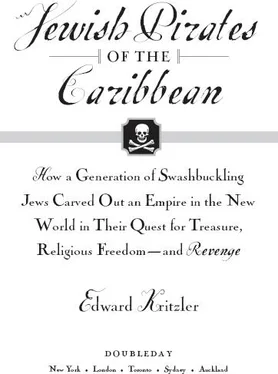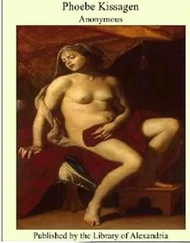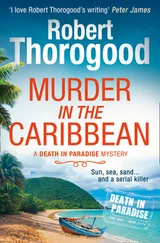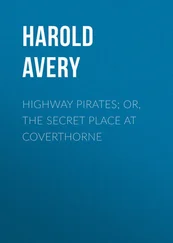Edward Kritzler - Jewish Pirates of the Caribbean
Здесь есть возможность читать онлайн «Edward Kritzler - Jewish Pirates of the Caribbean» весь текст электронной книги совершенно бесплатно (целиком полную версию без сокращений). В некоторых случаях можно слушать аудио, скачать через торрент в формате fb2 и присутствует краткое содержание. Год выпуска: 2008, ISBN: 2008, Издательство: Knopf Doubleday Publishing Group, Жанр: Старинная литература, на английском языке. Описание произведения, (предисловие) а так же отзывы посетителей доступны на портале библиотеки ЛибКат.
- Название:Jewish Pirates of the Caribbean
- Автор:
- Издательство:Knopf Doubleday Publishing Group
- Жанр:
- Год:2008
- ISBN:9780385528368
- Рейтинг книги:3 / 5. Голосов: 1
-
Избранное:Добавить в избранное
- Отзывы:
-
Ваша оценка:
- 60
- 1
- 2
- 3
- 4
- 5
Jewish Pirates of the Caribbean: краткое содержание, описание и аннотация
Предлагаем к чтению аннотацию, описание, краткое содержание или предисловие (зависит от того, что написал сам автор книги «Jewish Pirates of the Caribbean»). Если вы не нашли необходимую информацию о книге — напишите в комментариях, мы постараемся отыскать её.
Jewish Pirates of the Caribbean — читать онлайн бесплатно полную книгу (весь текст) целиком
Ниже представлен текст книги, разбитый по страницам. Система сохранения места последней прочитанной страницы, позволяет с удобством читать онлайн бесплатно книгу «Jewish Pirates of the Caribbean», без необходимости каждый раз заново искать на чём Вы остановились. Поставьте закладку, и сможете в любой момент перейти на страницу, на которой закончили чтение.
Интервал:
Закладка:
While tons of New World gold poured into Charles’s treasury each year, it leaked out just as fast, and in the summer of 1534 he would need every ounce to defend his borders. 6His empire was under attack. Jacob Fugger, the German banker who had loaned him a half million ducats to bribe the electors to name him Holy Roman Emperor, had died, and the Fuggers refused to advance him any more coin. 7It was one thing for a pig herder to capture a New World empire and gather its riches; it was quite another to ensure their safe transfer to the Crown to fund his extravagances, fill his nobles’ pockets, and pay for soldiers to fight his enemies.
The New World was his golden goose. If Jews were best suited to care for the golden egg, then he would send them to the New World and get on with more pressing matters of state. France’s King Francis I and the Ottoman emperor, Suleiman the Magnificent, his two challengers for world dominance, were allied against him. Francis was backing border raids into Italy; Suleiman’s cavalry of 100,000 horsemen was camped on the eastern shore of the Danube rattling their sabers, while in the Mediterranean the sultan’s naval commander, Barbarossa, was on his way to attack Tunis, Charles’s last stronghold in North Africa.
There was also the enemy within, walking around in a monk’s habit spreading heresy. That summer three German princes rejected the True Faith and declared for Martin Luther, who was turning all of northern Europe into heretics. Charles hated Luther and would have smiled to see him roasted by the Inquisition, but he needed the princes’ help to defend his empire from the hordes of Suleiman. So he swallowed his anger, abided their heresy, and received their support.
The survival of Jamaica, in the midst of the Caribbean trading lanes, was essential to the security of the treasure ships that passed offshore, carrying the New World’s riches back to Spain. If it meant dealing with converted Jews to ensure their safety and prevent the strategic colony from becoming a pirate base, so be it. In 1522, three treasure-laden ships dispatched to him from Mexico by Cortés had been captured and diverted to France by an Italian pirate better known today for the bridge bearing his name as the discoverer of New York harbor—Verrazano. The Aztec plunder the Italian delivered to the royal court in Paris included a half ton of gold, 682 pounds of pearls, jewel boxes encrusted with topaz, mirrors of polished obsidian, an emerald as large as a man’s fist, three live jaguars—and of even greater value, the sea charts of the captured Spanish pilots. 8
When Charles demanded that Francis return the loot, the French king spoke for Europe’s other rulers when he mockingly told him: “The sun shines on me just the same as on you, and I would like to see the clause in Adam’s will that bars me from my share of the riches of the New World!” With these words, state-licensed piracy, known as privateering, commenced in the Caribbean and became the clarion call of sea rovers. 9
Given the threats to his empire, Charles was “quick to temper” when June 1534 passed and his treasure ships, due in May, hadn’t arrived. Finally, in early July, the galleons landed at Cádiz and off-loaded 21 million pesos’ worth of silver. When informed, Charles “danced a wild jig around with his son Philip and dwarf jester Perico.” When Perico said to the eight-year-old prince, “Your father is Lord of Half the World; soon you will be Lord of All,” it was said that Charles, who rarely let loose, “laff with no end.” 10
It was then that Charles, having received the communiqué that his Jamaica colony was foundering, agreed to send the “Portugals.” Although he may have suspected the converted Jews of heresy, Charles knew that he could count on them to conduct the necessary business of managing his empire.
The conversos of 1492 were initially welcomed into a society desperate to fill those positions in which the Jews of Spain had specialized. As New Christians, they quickly became an elite bourgeoisie of merchants, physicians, tax collectors, mapmakers, financiers, and advisers to the crown. But the rapidity of their success stirred emotions that only the flames of the Inquisition would calm. In 1534, even as their baptized children filled important commercial positions in an expanding empire and in the councils of her church, the Limpieza de Sangre (Pure Blood) law introduced to Santo Domingo in 1525 decreed the New World off-limits to all but Old Christians able to trace their ancestry back four generations. 11Whether one was a recent converso or a New Christian from 1391, a drop of Jewish blood rendered one unfit to forward God’s glory in Spain’s empire. The law barred New Christians from a growing list of professions, and even parts of Spain. To discourage escape, conversos were not permitted to sell their land or exchange promissory notes or bills of exchange.
Like his grandfather Ferdinand, Charles adhered to the principle that the end justifies the means. He therefore had no qualms about using conversos to salvage his Jamaican colony. Although he saw himself as a soldier for God, he did not let religious posturing stand in the way of self-interest. He financed wars in Europe by borrowing from anyone he could, sold futures in the gold ships to foreign bankers, pawned the Molucca islands to the king of Portugal, leased Venezuela and Chile to German bankers who hoped to discover El Dorado, and the following year (1535), courted Doña Gracia Méndez Nasi, a famous Jewess, for a sizeable loan from her Portuguese bank.
In Charles’s lifetime, his subjects explored and settled a world three times as big as the one into which he had been born, and he needed help, even if it meant dealing with suspect heretics. They would help him maintain his empire in ways no one else could. Throughout his reign, Charles needed, but never trusted, them. He was used to dealing with nobles and clergy, but the Jews were something else. The People of the Book had the arrogance of royalty and valued themselves not by physical prowess or even riches, but by knowledge, wisdom, and business acumen. They were his essential heretics, efficient pawns in his global chess game, to be moved about and sacrificed at will.
Included in the Royal Fifth Pizarro brought the king was a small gold box belonging to Atahualpa, the Inca chieftain, for the cocoa leaves that he and his subjects chewed for energy. Charles kept it for his snuff and may have been toying with it as he took time out from conquering the New World to ponder the problems of administering it. The king was known for his silent reflections—he often stared into the air, his clear blue eyes focused on some unknown object, while his mouth lay open (due to the protruding lower jaw characteristic of the Hapsburg line)—and one imagines him turning to Francisco Cobos, his hovering counselor, and saying in his constrained and measured way of talking: “Send for Acosta [the court Jew]; we require new settlers bound for Jamaica.”
Arriving at Port Esquivel in October, the new settlers were welcomed by the twenty “Portuguese” families already there. Today, these fifty Jewish families are credited with founding Villa de la Vega (Town by the Fertile Plain), Jamaica’s capital for more than three centuries. Now called Spanish Town, La Vega, founded in 1534, represents the earliest documented settlement of converted Jews in the New World. 12
Charles turned his attention next to the heathens at his door: Sultan Suleiman’s army, having overrun Persia and occupied Hungary, was on the move, and in the Mediterranean, Barbarossa’s armada of eighty-four ships had embarked from Constantinople to sweep Spanish power from the sea. 13
The sultan’s naval commander, Khair-ed-Din, known to Christians as Barbarossa for his flaming red beard, was a terror in the Mediterranean even before he joined with Suleiman. The son of an unknown Greek father and a renegade Christian mother, he earned his infamy for his treatment of Christian prisoners: He tortured the men, while keeping the most comely women for his harem.
Читать дальшеИнтервал:
Закладка:
Похожие книги на «Jewish Pirates of the Caribbean»
Представляем Вашему вниманию похожие книги на «Jewish Pirates of the Caribbean» списком для выбора. Мы отобрали схожую по названию и смыслу литературу в надежде предоставить читателям больше вариантов отыскать новые, интересные, ещё непрочитанные произведения.
Обсуждение, отзывы о книге «Jewish Pirates of the Caribbean» и просто собственные мнения читателей. Оставьте ваши комментарии, напишите, что Вы думаете о произведении, его смысле или главных героях. Укажите что конкретно понравилось, а что нет, и почему Вы так считаете.












